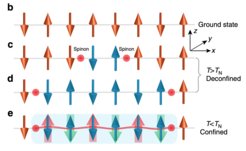Unconventional states explored by thermal transport
Unconventional quantum states of matter occur in solids when electrons interact strongly and thereby form new many-body states. Examples are unconventional superconductivity, multipolar orders or spin liquids. Theoretical understanding of these complex states is often nourished by insight from experiments. Especially, properties of the low-energy excitations give important information on the ground state of a material.

In this project, the PhD student will measure thermal transport as a function of temperature and magnetic field. Thermal conductivity has the power to detect interesting excitations which have no electric charge such as magnetic excitations. Additionally, it gives information on their scattering.
More concretely, we will be interested in measurements of thermal conductivity in insulating quantum magnets [1]. In these materials, unconventional particles named spinons are predicted, that we will try to detect. After an initial modification of the setup, the thermal Hall effect (an analogy of the electrical Hall effect) will be measured. This quantity was found to present interesting but little understood properties in a number of different materials.
Supervised by Prof. Elena Hassinger at TU Dresden and Prof. Andy Mackenzie at MPI CPfS, the PhD student will carry out thermal conductivity measurements in existing high-sensitivity setups reaching temperatures down to 30 mK. The successful candidate should have excellent experimental skills combined with a deep understanding of solid-state physics.












